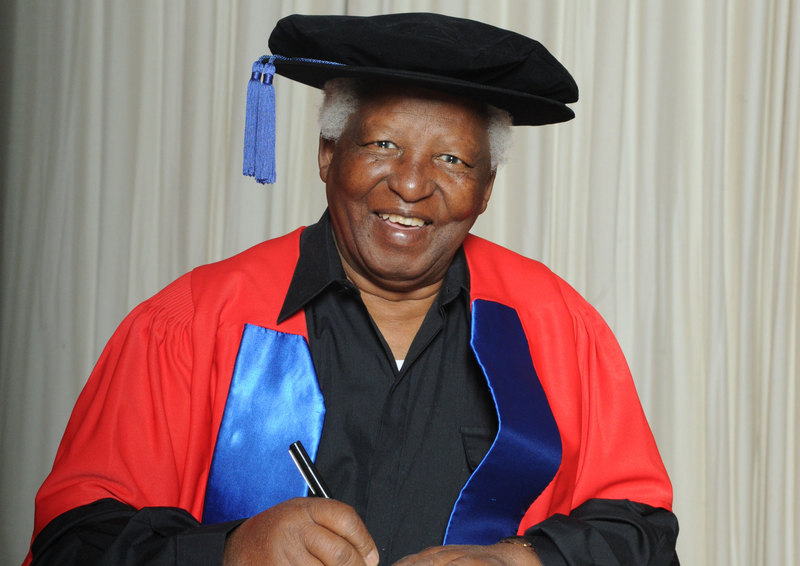Peter Magubane (1932–2024)
01 January 2024 | Compiled by Niémah Davids. Photo UCT News. Read time 5 min.
18 January 1932 – 1 January 2024
Acclaimed, multi-award-winning lensman, anti-apartheid stalwart, and the recipient of a 2010 University of Cape Town (UCT) honorary doctorate, Peter Magubane has died, two weeks before his 92nd birthday.
The legendary photographer, best known for capturing the brutalities of apartheid passed away peacefully at his home on Monday, 1 January.
Reacting to news of the passing of the legendary photojournalist, UCT Vice-Chancellor interim Emeritus Professor Daya Reddy lauded Magubane for the immense contribution he made to expose the atrocities of the apartheid regime to the outside world; and expressed his deep appreciation for Magubane’s contribution to historical archives.
“We have seen the world of yesteryear through the lens of Peter Magubane – from the 1956 women’s anti-pass law march, the 1960 Sharpeville Massacre and the June 16, 1976 protests by schoolchildren – he captured it all, documenting the brutality of the apartheid regime and the bravery of South Africans who challenged the status quo. Upon accepting the degree of Doctor of Literature, honoris causa from the University of Cape Town in 2010, the legendary photojournalist said: ‘a struggle without documentation is no struggle’. Indeed, the youth of today would have a much poorer sense of the impact of and struggle against apartheid without the work of Magubane. To him we say: thank you for the sacrifices you made and for all the images our scholars and students are able to draw on to this day, to expand their knowledge and understand the history of this country”.
Quintessential photographer
Magubane had worked at Drum Magazine as a driver for just six months when he was dispatched on his first photographic assignment, under the guidance of chief photographer Jürgen Schadeberg. His task was to cover the 1955 African National Congress (ANC) Convention, and as they say, the rest is history. Thereafter, he proceeded to document significant events in South Africa’s history, including the Sharpeville Massacre, the Rivonia Trial and the Soweto Uprising.
Undoubtedly, his was an illustrious career through which he inspired generations of photojournalists, among them Ruth Motau, who had the privilege of being mentored by Magubane.
Said Motau: “In the beginning of my career in the 90’s as a female photographer from Soweto with no one to look up to, Peter Magubane was one of the photographers that guided me through my journey. I never felt alone. The first time I exhibited with Peter Magubane I remember him asking if I was paid; I said no and he said I should tell the curator that Peter said you should pay me and I was paid”.
As a black photographer in apartheid South Africa, Magubane was forced to great lengths to capture the atrocities of the time. This, he noted years later, sometimes meant hiding his camera in hollow bread loaves, empty milk cartons and in a Bible.In 2015 Magubane told the United Kingdom’s Guardian: “I didn’t want to leave the country to find another life. I was going to stay and fight with my camera as my gun. I did not want to kill anyone, though. I wanted to kill apartheid.”
Harassment, arrest, defiance
His successful attempts to expose the brutalities of the apartheid regime earned him international acclaim, but back home, led to his arrest in 1969. Magubane was jailed and tortured and spent 586 days in solitary confinement. On his release from prison, he could not leave his home without being seen by police and was barred from executing his craft for five years. But with the Soweto Uprising in June 1976, he deified this order and went on to document how apartheid police massacred protesting school-going children.
After the late former president Nelson Mandela’s release from prison in 1990, Magubane was appointed as his official photographer. And he continued to capture historic events in the country’s transition to democracy, the first democratic election and significant moments during the Truth and Reconciliation Commission hearings.
Notable awards
Over the years Magubane has earned a list of impressive, well-deserved awards. In 1958 he became the first black South African to receive a photographic prize in the country and earned first and third place respectively for Best Press pictures of the year. In 1964, while working as a freelance photographer in London, he became the first black South African to hold an exhibition of his work at the London School of Printing.
Some of his other prestigious awards include the Lifetime Achievement Award from the National Press Photographers’ Association; several honorary doctorates from local and international universities (including an honorary doctorate in literature from UCT); and the Nat Nakasa Award for Media Integrity – awarded annually by Print Media SA, the South African National Editors Forum and the Nieman Society.
 This work is licensed under a Creative Commons Attribution-NoDerivatives 4.0 International License.
This work is licensed under a Creative Commons Attribution-NoDerivatives 4.0 International License.
Please view the republishing articles page for more information.










